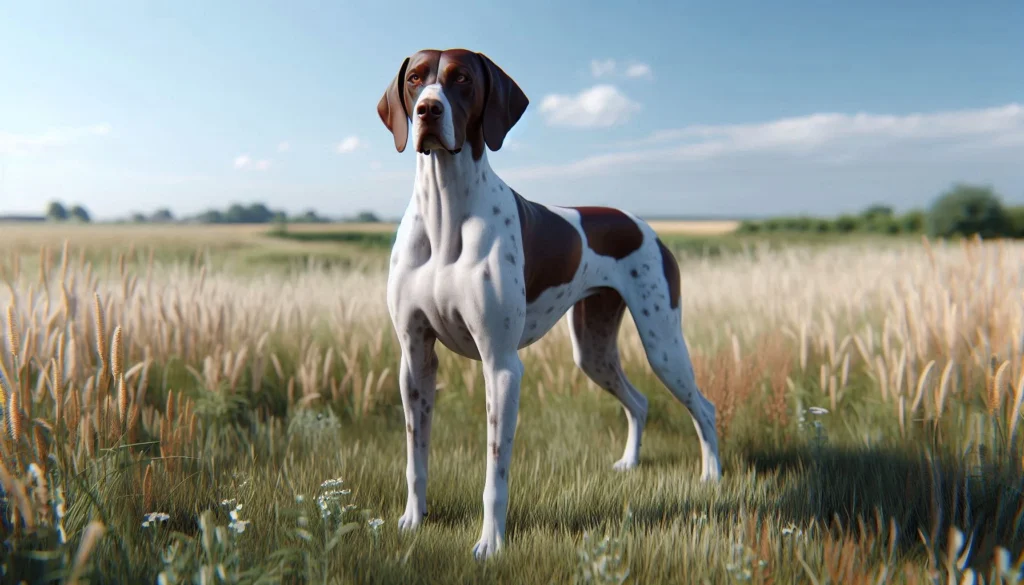Table of Contents
🐶 Pointer Dog Breed: History, Traits and Care Tips
The Pointer dog breed, often simply referred to as the Pointer, is renowned for its exceptional hunting prowess, athleticism, and friendly disposition. Distinguished by its elegant appearance and energetic nature, the Pointer has won the hearts of many dog enthusiasts. This breed is particularly popular among hunters and families alike due to its intelligence, trainability, and loyal companionship. Whether you’re an experienced dog owner or contemplating adopting your first pet, the Pointer could be a rewarding addition to your household.
📜 Short History
The Pointer’s history dates back to the 17th century in England, where it was initially bred for pointing game birds. The breed likely resulted from crossing several hunting dogs, including the Spanish Pointer, Bloodhound, Greyhound, and Foxhound. Its primary role was to locate and point out game birds for hunters, a task it performed with remarkable efficiency.
Interestingly, the Pointer earned its name from its distinctive behavior of “pointing” standing still and aiming its nose towards the game, indicating its location to the hunter. Over time, this breed’s exceptional skills led to its widespread use and popularity in various hunting expeditions across Europe and America.
📌 Quick Facts & Essential Details

| Category 🏷️ | Details 📖 |
|---|---|
| 🐶 Breed Name | Pointer |
| 📛 Other Names | English Pointer |
| 📍 Origin | England |
| 🏆 Recognized By | AKC, FCI, UKC, CKC |
| 📏 Size Variants | Standard (No toy or miniature versions) |
| ⚖️ Weight Range | 45 – 75 lbs (20 – 34 kg) |
| 📐 Height Range | 23 – 28 inches (58 – 71 cm) |
| 🎂 Lifespan | 12 – 15 years |
🐕🦺 Coat & Appearance

| Category 🏷️ | Details 📖 |
|---|---|
| 🧥 Coat Type | Short, smooth, and dense |
| 🎨 Coat Colors | Lemon & White, Liver & White, Black & White, Orange & White, Solid Colors |
⚡ Energy & Personality
| Category 🏷️ | Details 📖 |
|---|---|
| 🔋 Energy Level | Very High – Requires extensive daily exercise |
| 🏅 Breed Group | Sporting Group |
| 🐾 Temperament | Intelligent, Loyal, Friendly, Energetic |
| 🏡 Apartment-Friendly? | No – Needs space and an active lifestyle |
| 🎓 Trainability | Very High – Quick learners, eager to please |
🏥 Health & Care Needs

| Category 🏷️ | Details 📖 |
|---|---|
| 💉 Common Health Issues | Hip Dysplasia, Progressive Retinal Atrophy (PRA), Epilepsy, Bloat |
| 🛁 Grooming Needs | Low – Occasional brushing and bathing |
| 🍂 Shedding Level | Low to Moderate – Seasonal shedding |
| 🏃 Exercise Needs | Very High – Needs long walks, running, and mental stimulation |
🏡 Suitability & Compatibility

| Category 🏷️ | Details 📖 |
|---|---|
| 🏠 Best For | Active Owners, Hunters, Large Homes with Yards |
| 🚫 Not Ideal For | Apartment Living, Sedentary Owners |
| 🔊 Barking Level | Low – Generally quiet but may bark when excited |
| 👶 Good With Kids? | Yes – Playful and gentle with children |
| 🐕 Good With Pets? | Yes – If socialized early |
| 👩🏫 First-Time Owner Friendly? | Yes – If committed to exercise and training |
| 🌡️ Weather Tolerance | Good in moderate climates, sensitive to extreme cold |
🎉 Fun & Extra Info
| Category 🏷️ | Details 📖 |
|---|---|
| 🌟 Famous Dogs of This Breed | Frequently seen in field trials and hunting competitions |
| 🧠 Intelligence Level | Very High – Excels in obedience and agility |
| 🐕 Common Behavioral Issues | Separation Anxiety, Restlessness, Strong Prey Drive |
| 🥩 Best Diet | High-protein diet suited for active dogs |
| 🚫 Foods to Avoid | Chocolate, Grapes, Onions, Garlic, High-Fat Foods |
| 🎈 Fun Fact | Pointers are known for their “pointing” stance, where they freeze and lift one paw to indicate game! |
| 💰 Price of Puppy | $1,000 – $2,500 (Depending on breeder & lineage) |
✅ Final Thoughts
The Pointer is a high-energy, intelligent, and affectionate breed that thrives in active households. With their strong hunting instincts, trainability, and athleticism, they make great companions for hunters, joggers, and families with large yards. If you’re looking for a loyal, energetic, and skilled working dog, the Pointer could be the perfect match! 🏡🐶
📊 Comparison of Similar Dog Breeds
🐶 Pointer vs. Weimaraner 🎯


| Feature 🏆 | Pointer (English Pointer) 🇬🇧 | Weimaraner 🇩🇪 |
|---|---|---|
| 📍 Origin | England | Germany |
| 🏅 Recognized By | AKC, FCI, UKC | AKC, FCI, UKC |
| 📏 Size Variants | Medium to Large | Large |
| ⚖️ Weight Range | 45-75 lbs (20-34 kg) | 55-90 lbs (25-41 kg) |
| 📏 Height Range | 23-28 inches (58-71 cm) | 23-27 inches (58-69 cm) |
| ⏳ Lifespan | 12-17 years | 10-13 years |
| 🐶 Coat Type | Short, smooth, sleek | Short, sleek, smooth |
| 🎨 Coat Colors | Lemon & white, liver & white, black & white, orange & white | Silver, gray, blue-gray |
| ⚡ Energy Level | Very High | Very High |
| 🏡 Breed Group | Sporting Group | Sporting Group |
| 🔊 Barking Level | Low to Moderate | Moderate |
| 👶 Good With Kids? | Yes, playful & affectionate | Yes, loyal & energetic |
| 🐕 Good With Pets? | Yes, with proper socialization | Yes, but strong prey drive |
| 🧠 Intelligence Level | Very High (Quick Learner) | Very High (Trainable but Independent) |
| ⚠️ Common Behavioral Issues | Needs a job, high energy, can be stubborn | Prone to separation anxiety, high prey drive |
| 💰 Price of Puppy | $1,000 – $2,500 | $1,500 – $3,500 |
| Overall Rating | ⭐⭐⭐⭐⭐ (Energetic & Trainable) | ⭐⭐⭐⭐⭐ (Smart & Loyal) |
Conclusion
In summary, the Pointer dog breed is a remarkable combination of elegance, agility, and friendliness. Its rich history, distinct physical characteristics, and amiable temperament make it a favorite among hunters and families alike. Whether you’re drawn to its hunting prowess or its affectionate nature, the Pointer is a breed that can bring joy and companionship to the right home. If you’re considering a new pet, exploring the Pointer dog breed could be a rewarding endeavor.
FAQ
Is the Pointer a dangerous dog?
No, the Pointer is not considered a dangerous dog. They are known for their friendly and sociable nature. However, like any breed, proper training and socialization are essential to ensure good behavior.
Is the Pointer the best guard dog to protect you or your family?
While Pointers are loyal and alert, they are not typically used as guard dogs. Their friendly disposition makes them more likely to greet strangers than to deter them. For protection purposes, breeds specifically trained for guarding might be more suitable.


